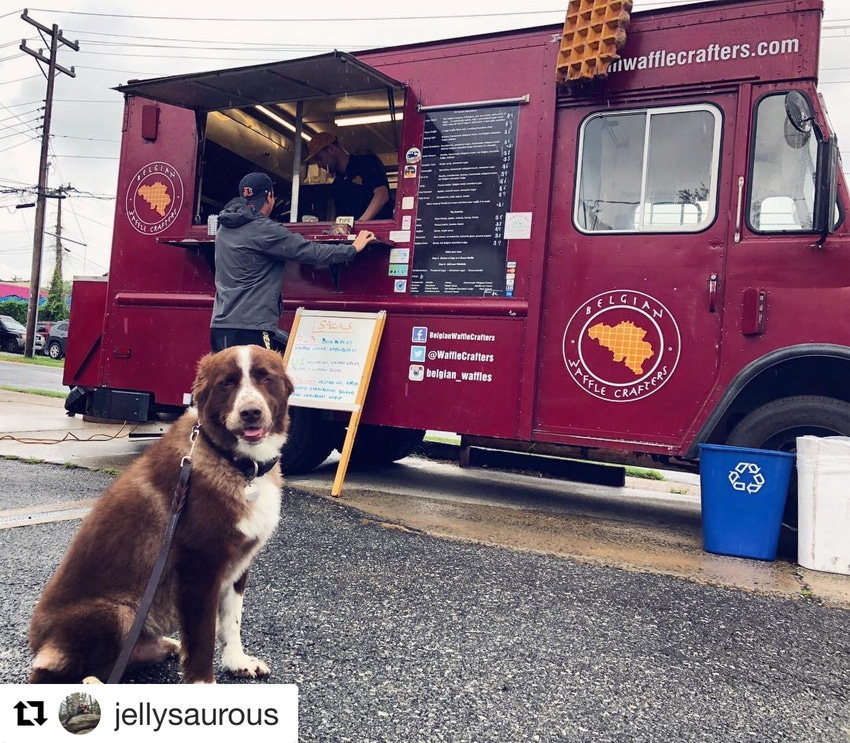Nonprofit Don’t Waste Durham developed a green truck certification program to help vendors reduce their carbon footprint.

Food trucks crank out hundreds to a thousand or so meals a day, generating mega volumes of wasted food, utensils, cups and containers. And it’s up to their customers to dispose of their trash in the nearest bin—there is no waitstaff to pick up after them.
North Carolina-based nonprofit Don’t Waste Durham developed a green truck certification program to help vendors reduce their carbon footprint. Businesses are supported in achieving 18 requirements, including using reusable service ware or compostable materials and serving on recyclable supplies when reusable and compostable are not options. And they are to source local food, among requirements.
Vendors learn of local foodservice suppliers, are hooked up with compost haulers and taught how to cut costs and waste. They get discounts for supplies, affordable pickup service and priority bookings at venues.
“We start with a meeting and assess where vendors are. Some are already doing a lot of things required for certification and want to be recognized and receive benefits,” says Crystal Dreisbach, executive director at Don’t Waste Durham.
For others, these green practices are a new concept, and the nonprofit meets them where they are to help them transition.
“We educate them around the fact that landfilled organics are one of the primary drivers of global climate change. And we explain what is compostable because there is a lot of misleading language out there,” adds Dreisbach.

Vendors have no downtime, so program facilitators try and make it easy for them, for instance by providing a laminated booklet to attach to truck windows that answers curious customers’ questions like why compostable over recyclable? And why should I consider composting at home?
François Kerckhof, owner of Waffle Crafter in Chapel Hill, sells a thousand waffles a week out of his food truck in high season.
Coming from Europe, he says he was already “green-minded” and got certified to continue on that path. But now he does more, with composting being among new practices.
“Don’t Waste Durham explained the basic rules of composting and set me up with a collector. I did not want to do it myself, because I did not want to attract insects and animals,” says Kerckhof.
He puts compostable waste out once a week and pays $6 a collection. His only added cost is the eco-friendly utensils and plates.
So far, only 10 vendors have gone through Don’t Waste Durham’s program. But 250 more are on a waiting list as the nonprofit looks for funding to hire a program coordinator—a role it currently depends on volunteers for.
Durham Central is a 5-acre, city-owned park that does food truck rodeos, drawing about 50 food trucks and about six craft breweries to events.
“People in Durham are super food truck crazy. There weren’t many food truck regulations in Durham several years ago, so it was easy to set up here, and we have lots of trucks,” says Erin Kauffman, executive director of nonprofit Durham Central Park, Inc.
The organization did a pilot focused on reducing waste generated at its rodeos, which entailed setting up stations with three bin types: compost, recycle and trash.
“We noticed a lot of Styrofoam and other things that couldn’t be recycled or composted going into the bins. We started putting rules on vendors, and we went from filling a huge dumpster at each event to six or seven large trash bags. Then, we got involved with Don’t Waste Durham and their sustainable food truck program,” says Kauffman.
Event goers get brochures with maps of food trucks, with a green star next to those that are certified as sustainable.
“People don’t generally comment about this, but they do say how cool it is we compost and thank us for doing it,” says Kauffman.
Since So Good Pupusas got its food truck certified, it’s not only switched to recyclable and compostable materials but has plans to go further, thinking about how it sources foods.
“Businesses are some of the biggest contributors to conditions that are harming our planet, and we are choosing to counter that early on. It is a big investment and commitment, but we think it's very important,” says Cecilia Polanco, CEO of So Good Pupusas.
Kauffman believes people are motivated to learn about these business practices but not educated about what products and vendors are truly green.
Speaking of the Durham trucks, she says, “If customers see the green star and ask what it means, they might be interested in learning what else they can do and how to distinguish between what’s compostable and what’s not.”
About the Author(s)
You May Also Like




